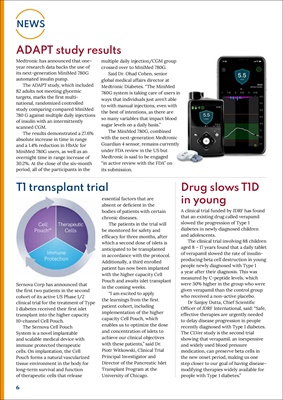
6
NEWS
ADAPT study results
Medtronic has announced that oneyear
research data backs the use of
its next-generation MiniMed 780G
automated insulin pump.
The ADAPT study, which included
82 adults not meeting glycemic
targets, marks the first multinational,
randomized controlled
study comparing compared MiniMed
780 G against multiple daily injections
of insulin with an intermittently
scanned CGM.
The results demonstrated a 27.6%
absolute increase in time in range
and a 1.4% reduction in HbA1c for
MiniMed 780G users, as well as an
overnight time in range increase of
30.2%. At the close of the six-month
period, all of the participants in the
multiple daily injection/CGM group
crossed over to MiniMed 780G.
Said Dr. Ohad Cohen, senior
global medical affairs director at
Medtronic Diabetes. "The MiniMed
780G system is taking care of users in
ways that individuals just aren't able
to with manual injections, even with
the best of intentions, as there are
so many variables that impact blood
sugar levels on a daily basis."
The MiniMed 780G, combined
with the next-generation Medtronic
Guardian 4 sensor, remains currently
under FDA review in the US but
Medtronic is said to be engaged
"in active review with the FDA" on
its submission.
T1 transplant trial
Sernova Corp has announced that
the first two patients in the second
cohort of its active US Phase 1/2
clinical trial for the treatment of Type
1 diabetes received their first islet
transplant into the higher capacity
10-channel Cell Pouch.
The Sernova Cell Pouch
System is a novel implantable
and scalable medical device with
immune protected therapeutic
cells. On implantation, the Cell
Pouch forms a natural vascularized
tissue environment in the body for
long-term survival and function
of therapeutic cells that release
essential factors that are
absent or deficient in the
bodies of patients with certain
chronic diseases.
The patients in the trial will
be monitored for safety and
efficacy for three months, after
which a second dose of islets is
anticipated to be transplanted
in accordance with the protocol.
Additionally, a third enrolled
patient has now been implanted
with the higher capacity Cell
Pouch and awaits islet transplant
in the coming weeks.
"I am excited to apply
the learnings from the first
patient cohort, including
implementation of the higher
capacity Cell Pouch, which
enables us to optimize the dose
and concentration of islets to
achieve our clinical objectives
with these patients," said Dr.
Piotr Witkowski, Clinical Trial
Principal Investigator and
Director of the Pancreatic Islet
Transplant Program at the
University of Chicago.
Drug slows T1D
in young
A clinical trial funded by JDRF has found
that an existing drug called verapamil
slowed the progression of Type 1
diabetes in newly diagnosed children
and adolescents.
The clinical trial involving 88 children
aged 8 - 17 years found that a daily tablet
of verapamil slowed the rate of insulinproducing
beta cell destruction in young
people newly diagnosed with Type 1
a year after their diagnosis. This was
measured by C-peptide levels, which
were 30% higher in the group who were
given verapamil than the control group
who received a non-active placebo.
Dr Sanjoy Dutta, Chief Scientific
Officer of JDRF International, said: "Safe,
effective therapies are urgently needed
to delay disease progression in people
recently diagnosed with Type 1 diabetes.
The CLVer study is the second trial
showing that verapamil, an inexpensive
and widely used blood pressure
medication, can preserve beta cells in
the new onset period, making us one
step closer to our goal of having diseasemodifying
therapies widely available for
people with Type 1 diabetes."